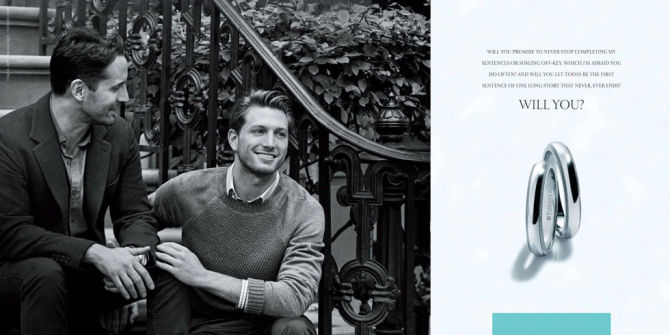From one of the blogs at Ad Age, we have some more fashionable celebration of gay marriage from the one of the premiere jewelers in America.
Here’s the ad:
The copy reads:
Will you promise to never stop completing my sentences or singing off-key, which I’m afraid you do often? And will you let today be the first sentence of one long story that never, ever ends?
WILL YOU?
Ogilvy & Mather, the agency responsible, only won the Tiffany’s account this past February.
The Holiday sales results for Tiffany’s this past season were down by 1%, with overall worldwide sales down by 3%. This news coincided with an 11% drop in the stock price.
The blogger at Ad Age was nonplussed:
Yet with Tiffany & Co. already following in the footsteps of brands including Gap, Banana Republic, Cheerios and The Knot, it’s likely that such ads will soon be commonplace, not bad ass at all — which is a good thing.
Is that good for the client, though? Is this good for Tiffany’s, which needs to turn itself around? An 11% dip in the stock price is considerable for a brand that dates back to 1837. Brands that date back to 1837 do not change ad agencies frequently.
If you look at the previous year, before the transition, holiday sales were actually up 4% for 2013 — making the results from the new agency even worse, in comparison to the momentum which was already in place, when the agency that got fired was running the show.
One of David Ogilvy’s most-quoted lines is that a copywriter needs to be both a ‘poet and a killer.’
Meaning that poetry is necessary to make the ad beguiling, but that the ad is a means to an end, and that end is to ensure that Tiffany’s doesn’t have to start firing people and shutting down stores because the ad agency is fucking up their account to agitate for social justice.
Let’s think about this for a moment.
Who buys from Tiffany’s? Who are the big customers?
Not gay men. Gay men barely get married, despite all the hooplah over it. There are two major groups of buyers of that little blue box: women and the men who love those women.
Statistically speaking, gay men are non-existent. It’s a total of roughly 9 million, including women. Some polls say 1.8% of men. If they wanted to reach just those men, they could have put the ad in Out or something like that. Instead, they promoted it nationally, to a general audience.
What Tiffany’s has done is to do more to alienate the people who are actually likely to be married, and are actually likely to get married, and are going to buy those little blue boxes as gifts for their beloved every Valentine’s, birthday, and Christmas.
Those people are overwhelmingly white, not transgender, and Christian.
Miley Cyrus praised the ad.
Miley Cyrus is the opposite of the sort of person who is supposed to be associated with Tiffany’s.
The brand identity of Tiffany is most easily phrased as “eternal love, elegant romance and priceless beauty.” Gay men tend to go for 0/3 of those. Unless you count obsessive workouts, meth addictions, and the pursuit of plastic surgery as ‘priceless beauty.’
The character most associated with Tiffany’s is Audrey Hepburn. Not Miley Cyrus.
What corporate America is going to discover as they continue going down the glory hole to social justice is that it does a lot of damage to their ability to sell things to the American core. And not just to the American core. But to the foreign affluent people who don’t believe in multiculturalism or the gay agenda or any of the rest of it.
They don’t care about this stuff in India. They don’t care about it in China. They don’t care about it in any of the Asian Tigers. It’s actually illegal in Russia. There are multiple big stores for Tiffany’s in Moscow alone!
This is a quirk of the Weimerian cities in the Anglo countries and Western Europe.
There are a lot of companies that you can buy high-end jewelry from. The main competitive advantage that this particular company has going for it is the symbolism of the blue box. That symbolism, worth more than $1 billion in sales a year, is now being associated with the thin fiction of eternal-gay-romance, a fiction that even gay men are often uncomfortable with, because it’s not borne out by reality.
The general comfort with the general unraveling in public mores is going to transition to surprise, then horror, as the results prove to diverge from the comforting fantasies of individualism taken to its logical conclusion. The empire, far from being cognizant of diversity, has become solipsistic, obsessed with its own lies of moral self-glorification.
